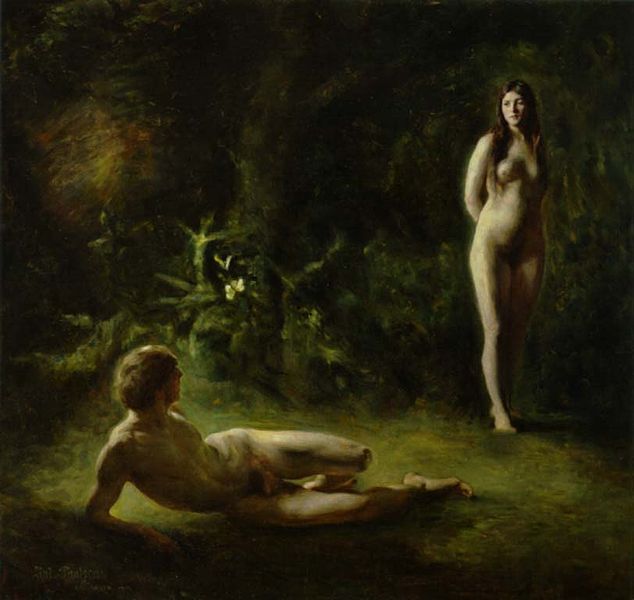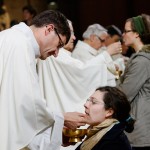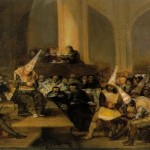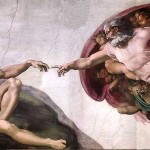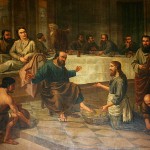A good, properly Catholic theology of the economy must start with a good anthropology. A good anthropology must have a healthy understanding of original sin. As we saw in the previous column, in the economic realm, a healthy understanding of original sin leads us to prefer markets as a mode of economic organization, since markets work by and through human limitation.
What else does Scriptural anthropology tell us about human nature ?
In the Genesis creation accounts which form the bedrock of Catholic anthropology we are told two fundamental things about human nature : the taint of sin, yes, but also that we are made in the image of God (Gen 1:27). Along with original sin, the Imago Dei is the other foundation stone of our understanding of human nature. A part of the Imago Dei which has certainly received a lot of attention, incommensurably rightly so, from Catholic tradition, is our rational nature, which is shared with the God who is also logos (Jn 1:1).
But another way in which we are in the image of God is that we are creators. The Catechism puts it well (§307) : “To human beings God even gives the power of freely sharing in his providence by entrusting them with the responsibility of ‘subduing’ the earth and having dominion over it (Gen 1:26-28). God thus enables men to be intelligent and free causes in order to complete the work of creation, to perfect its harmony for their own good and that of their neighbors. (…) They then fully become ‘God’s fellow workers’ and co-workers for his kingdom (1 Cor 3:9; 1 Thess 3:2; Col 4:11).” This Biblical duty and privilege of man to be co-creator embedded in the Genesis account is similarly understood by Jewish tradition, and is reflected in a particular way by the traditional Catholic emphasis on the necessity of human cooperation with divine Grace.
We are co-workers, both with each other and with God, engaged in the work of Creation; of Creation, Holy Tradition teaches us that it was not a discrete event at a point in time, but a continuous will by which God ceaselessly creates and sustains the world, a creative act in which, in His wisdom and generosity, God has invited us to participate as co-workers. That man’s creativity is a deep part of his very nature, and that God blesses human creativity, should be self-evident to all Christians, and the history of the Church provides a testimony to the best of man’s creativity in the domains of art, science, philosophy, and many more.
The implications for economic doctrine are both obvious and radical : a just economic system must privilege man’s creativity. An economic system faithful to our human nature and its Imago Dei must not only be judged by criteria such as the distribution of resources. This creative element of the economic life is too often silenced in popular retellings of Catholic social doctrine, even though it has been emphasized in the social magisterium of Saint John Paul II, who wrote in his encyclical Centesimus Annus (§32), “the role of disciplined and creative human work and, as an essential part of that work, initiative and entrepreneurial ability becomes increasingly evident and decisive.”
For there is such a thing as creativity in the economic realm. It is typically known as innovation.
In a culture where the word keeps popping up in the mouths of politicians and pundits, it’s easy to wonder whether economic innovation has any theological content, but it would be a mistake. As the economic historian Deirdre McCloskey has shown, innovation was the spark that lit the Industrial Revolution. We tend to think of free markets as superior because they produce better cars, or more cars, or cheaper cars. But the real reason why free markets are superior is because they made cars possible to begin with.
And again, there is this business of our duty to be fellow-workers with God. Since creating is what we are called to do, work that is an avenue to creation is ordered towards God’s will, and we find that market economies are much more creative, in every sense of that term, than other economies. In a certain Christian sense, that is perhaps even more important than the prosperity they create. One thinks of course of the figure of the entrepreneur, whose importance we can recognize without giving in to a boasting romanticism, but much more important is the everyday creativity of work life: the creativity of the lawyer, the engineer, the designer, the craftsman, the gardener…the carpenter. As we will investigate later in more detail, the economist Amar Bhidé has shown that innovation in a creative economy is much more the product of the decentralized, cooperative work of people inside and outside the firm, rather than something that springs fully formed from the thigh of the entrepreneurs our society tends to want to deify.
Creativity is at the heart of what makes a market economy function. It’s also at the heart of our nature, placed there by God as an icon of His transcendent creativity. Catholic economic theology must start from there.

